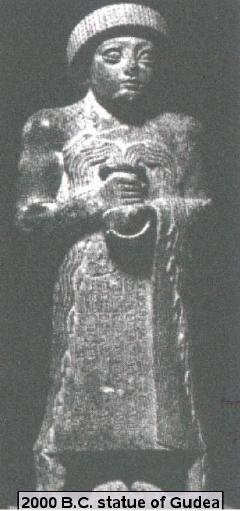Bread of Life and Water of Life
Other than “Light,” Jesus also refers to himself as "the bread descended from Heaven," and:
"I am the bread of life; he who comes to Me will not hunger" (John 6:35).
In our study of traditions, we know of only two human teachers who taught real and true neighborly love as a manifestation of divine guidance in the same way: Jesus and the Sumerian Gudea. And the truths they professed remain eternal even if human hatred, greed and ruthless desire to subjugate others prevented the permanent establishment of the kingdom of neighborly love among human beings. Listening from a distance of thousands of years, we hear them speak of a loving, caring, kind God, full of piety, who is truth itself. Their common teaching erases the 2000 years that separate them. So let us cast our eyes on Gudea's cuneiform writings, here, within our theme: the search for the Bread of Life.
Under no circumstances can we call coincidence Gudea also calling bread "of heavenly origin" and distributing it among the faithful of the church so that the "strength of the Light may fill our souls:" He says:
"'Bread is itself God,' then sprinkles it with the water of life, breaks the bread, and exclaims to the Mother Goddess: 'May the bread-giving God be showered with prayer,' while he gives everyone a piece of the bread."
Then, 2000 years later we hear Jesus say in John 6:51:
"Eat [this bread], it is my flesh, which I will give for the life of the world"
In both cases, the message is that bread is a divine gift to Mankind that transforms into divine strength.
Another divine substance is Water of Life, today's Holy Water and the basis of a Hungarian Easter ritual during which young men sprinkle water on the maidens of the village to promote life. Gudea openly proclaims neighborly love; and here we can see the heirloom he left us, a statue of him holding the wellhead of the Water of Life in his hand. This is how he teaches:
"Your heart is the chalice of neighborly love, of which it [neighborly love] should emanate as the Water of Life flows from the cup in my hand."
Then, 2000 years later, Jesus teaches us in John 4:14:
"But whoever drinks of the water that I will give him shall never thirst; but the water that I will give him will become in him a well of water springing up to eternal life"

In both cases—reference to Bread of Life and Water of Life—we have Jesus encouraging everyone, at the personal level, to come in direct contact with God, to take God within himself. Yet nowhere in the canonized scriptures do we find Jesus teaching us personal awareness of the Son of God, our immediate relationship to God—that is, without an intermediary such as a priest—and the homogeneity of divine and human souls.
In that two millennia that stretches between Gudea and Jesus, we find kingdoms that want to assure social welfare and happy civic life based on neighborly love, but alien cultures infiltrate these kingdoms and replace notions of Bread of Life and Water of Life with their selfish ideologies. The pitiless hatred and revenge ideology sweeps the land and defeats the law of neighborly love. Conquered peoples are forced to worship a vengeful foreign god; their innocent newborns are mass-mutilated; and new, ingenious methods are devised to exterminate entire populations that resist conversion to Judaism. And at the moment, and in that specific part of the world where such butcher-laws are at their peak, the Son of God appears and begins to teach:
"A new commandment I give to you, that you love one another" (John 13:34).
Jesus really had to enact a new law because neighborly love in Man's spirit has, to be sure, decayed seriously during the 2000 years since Gudea.

